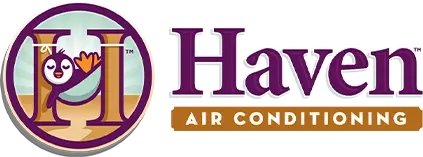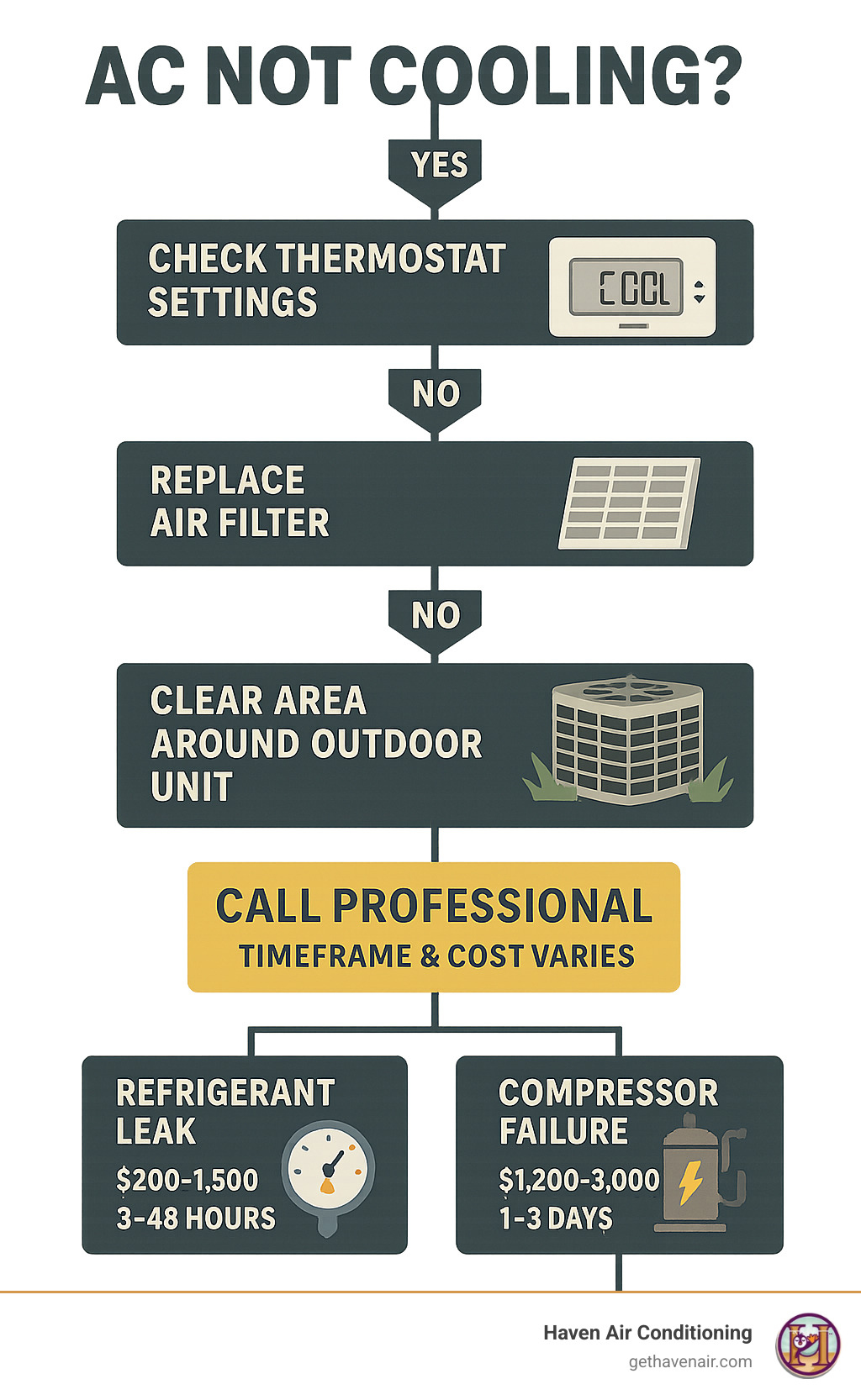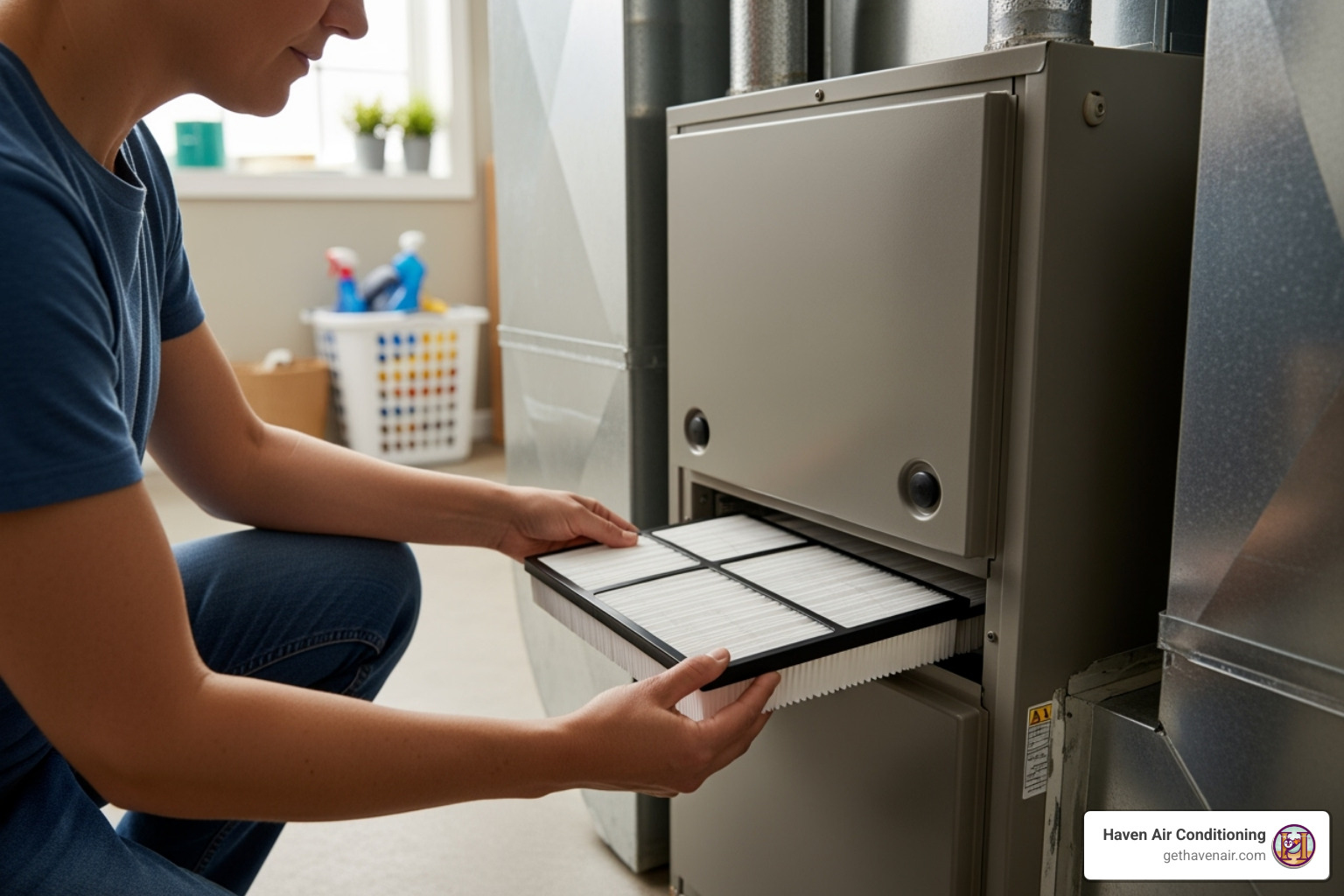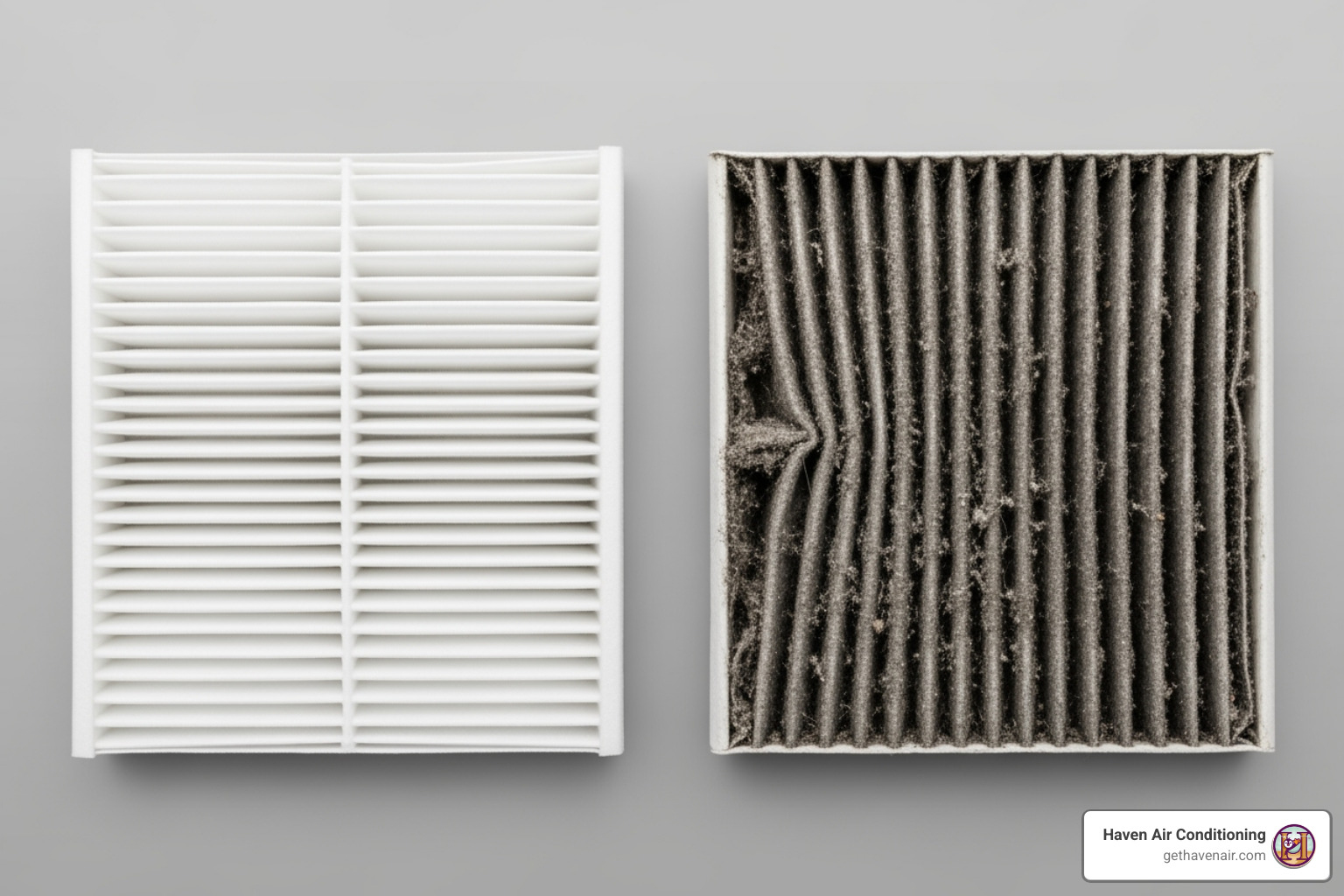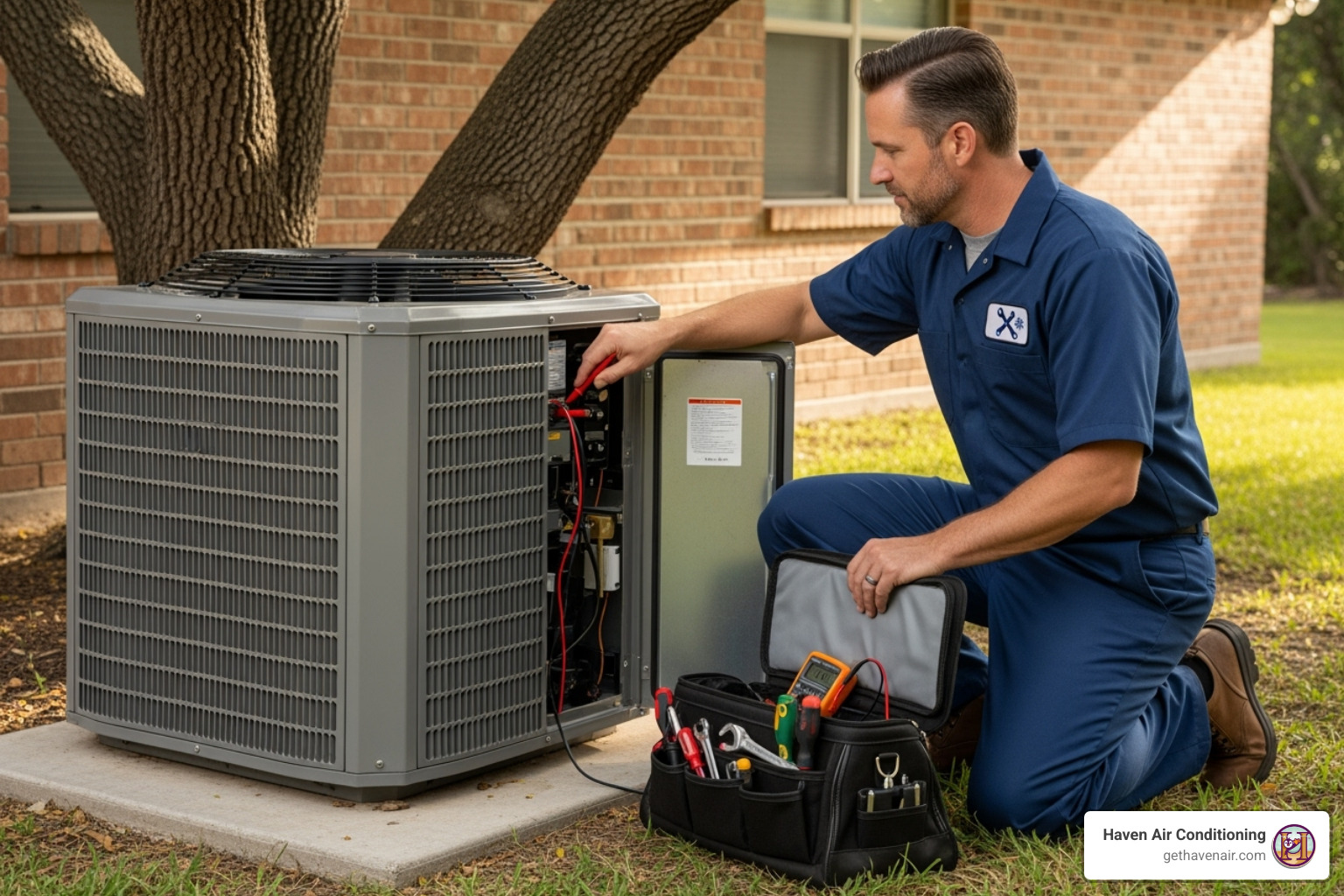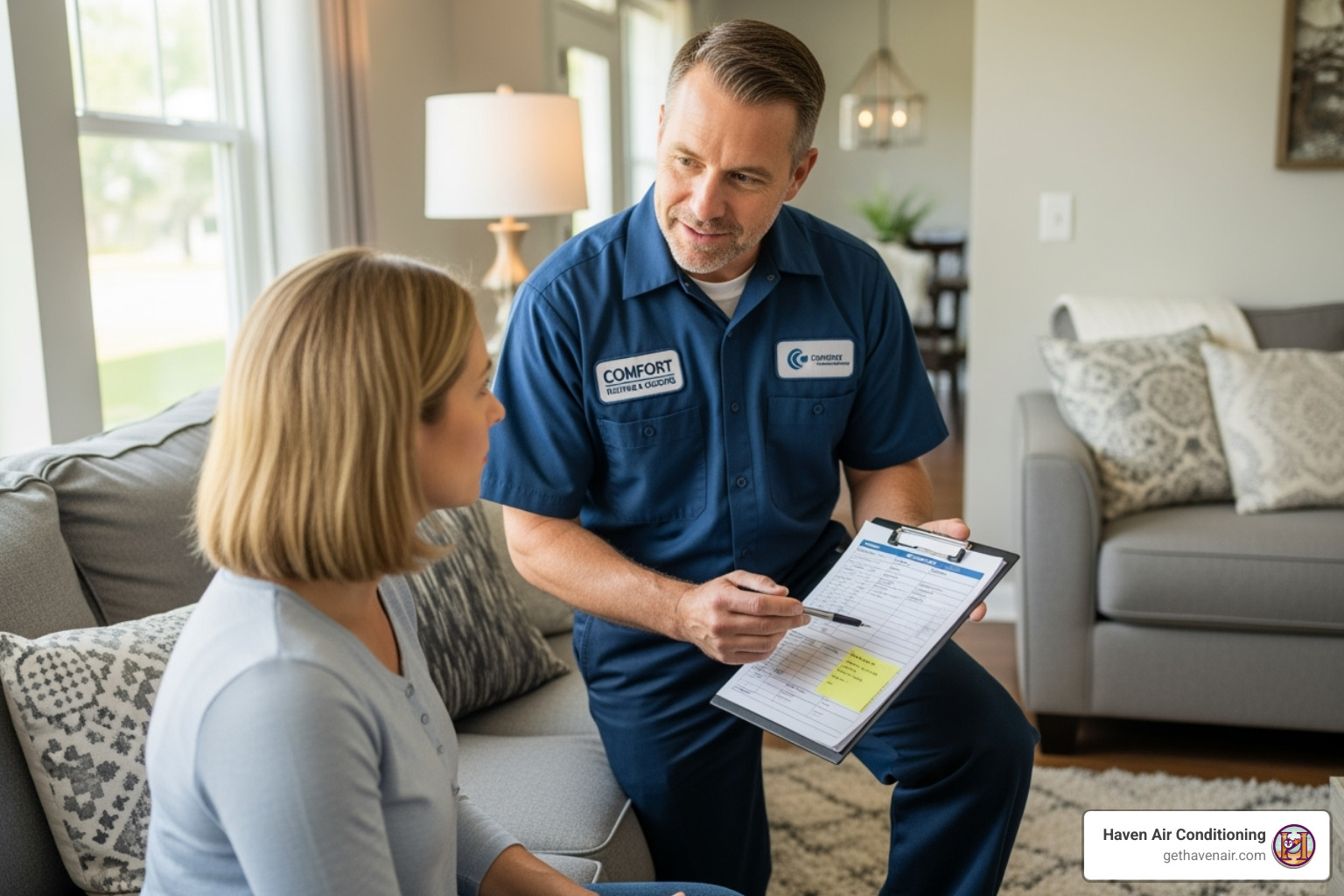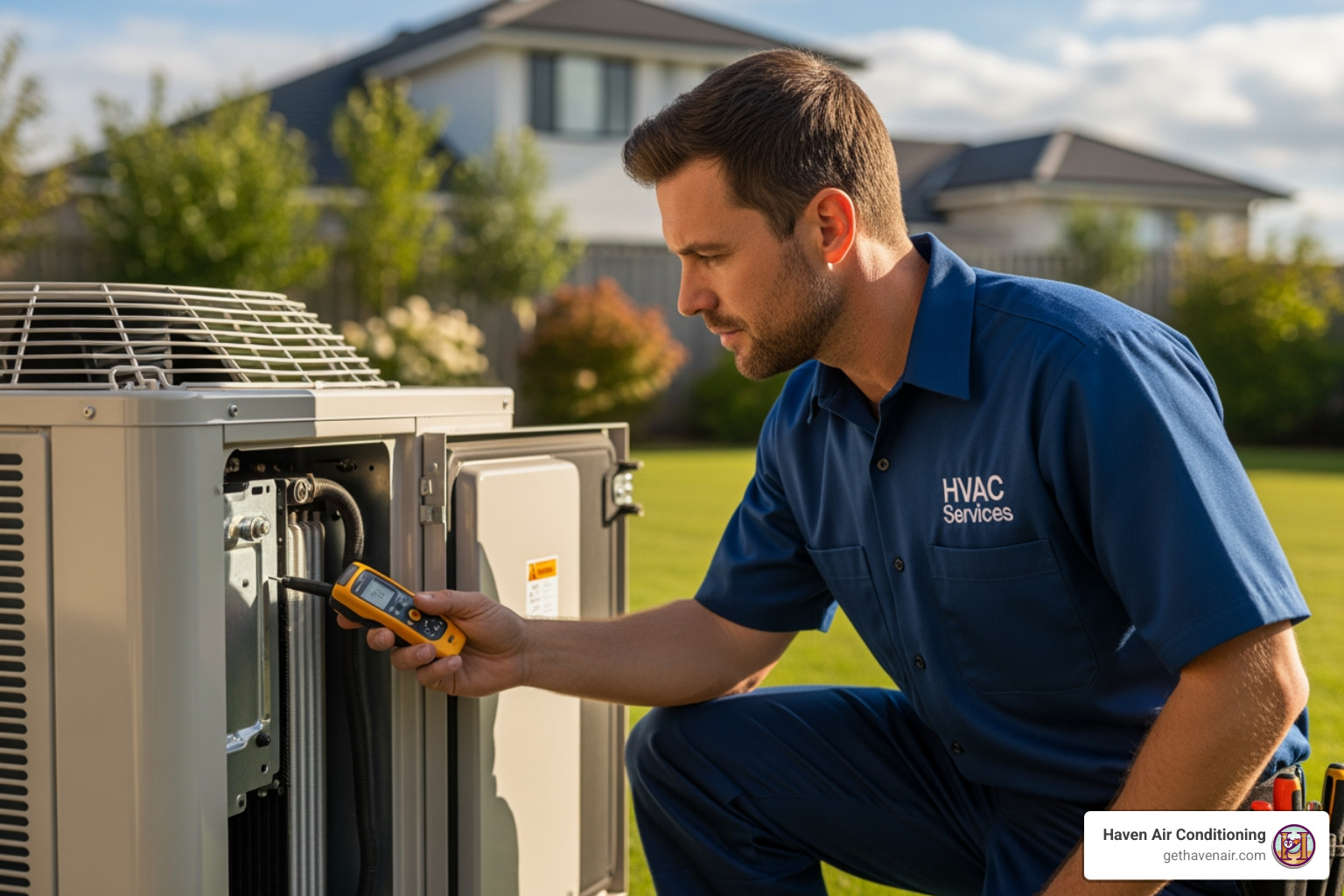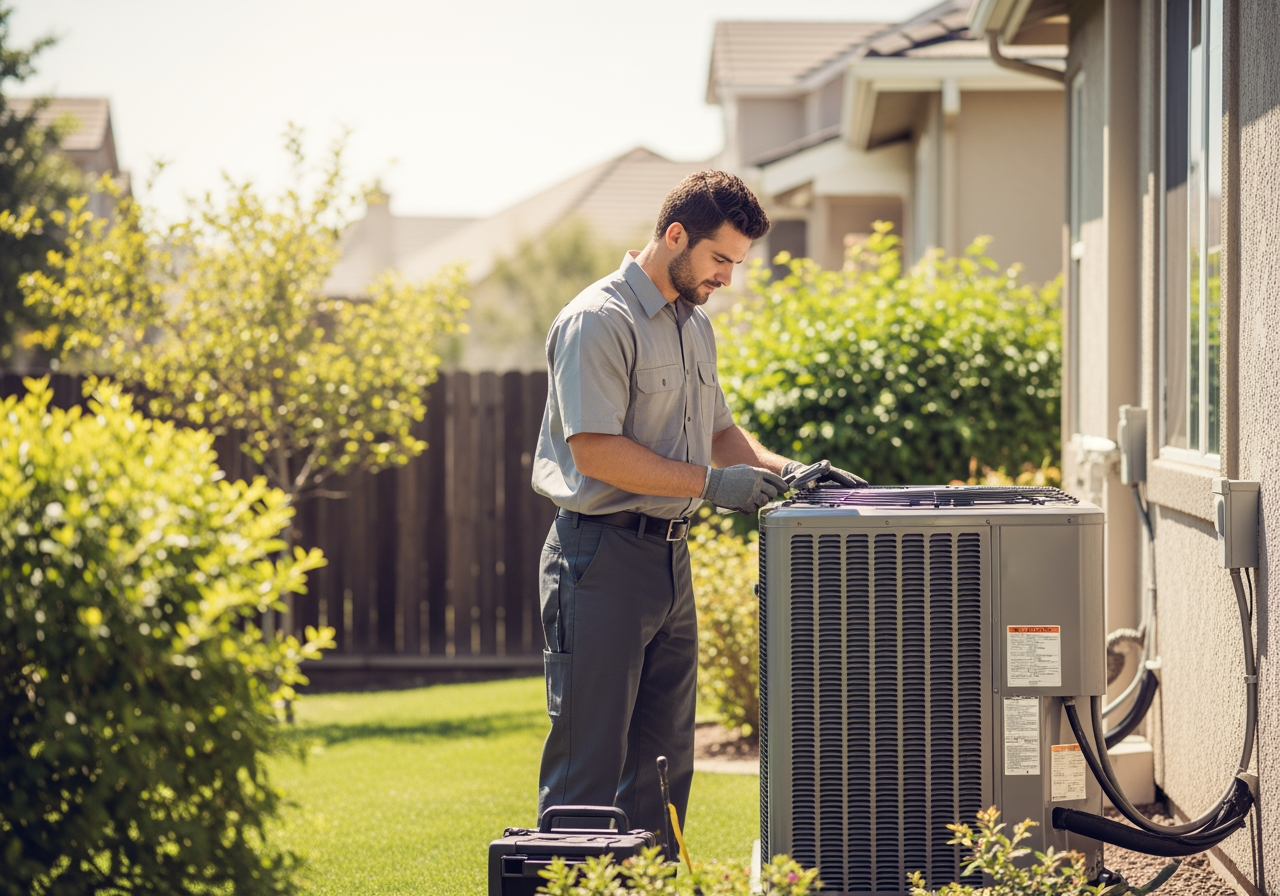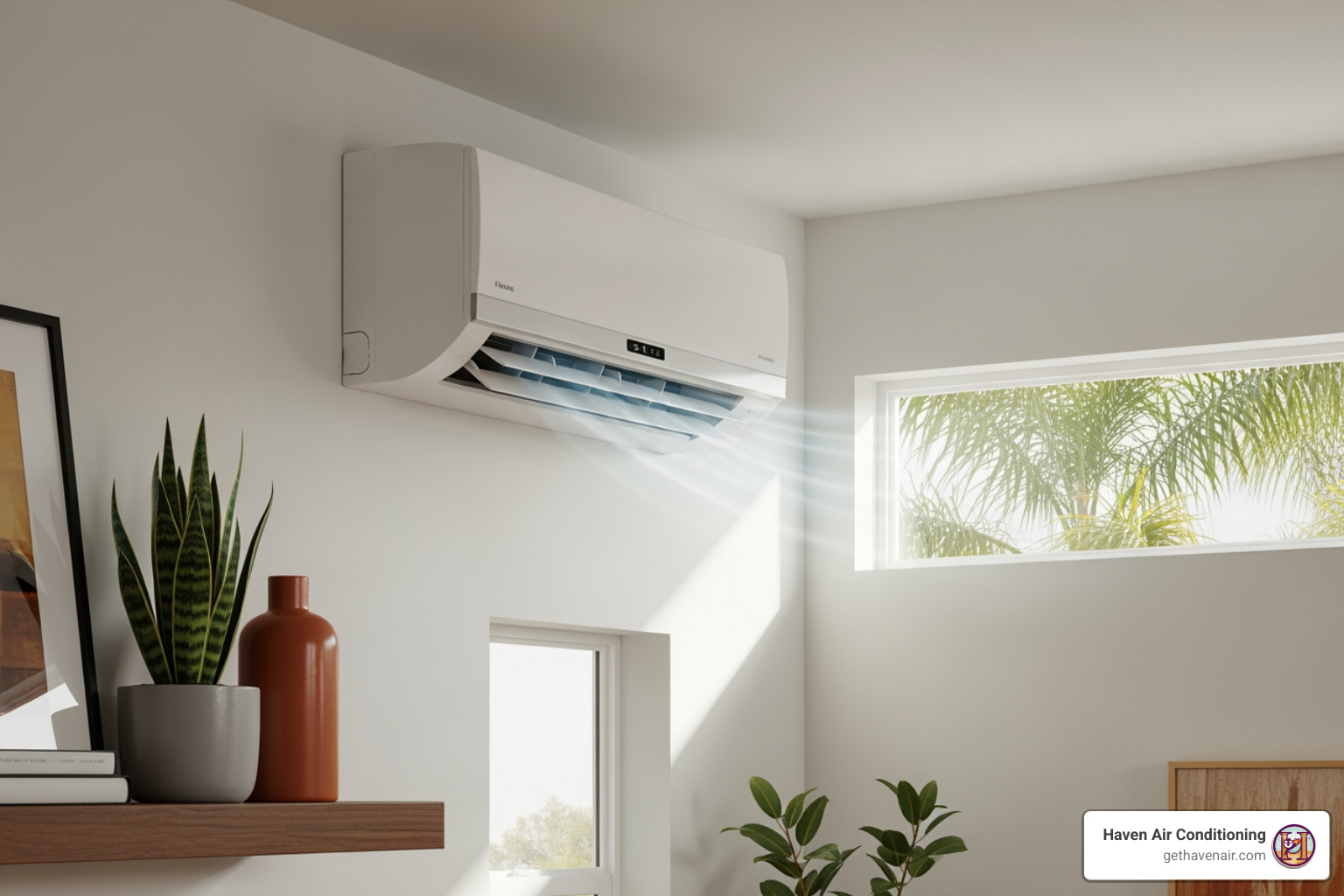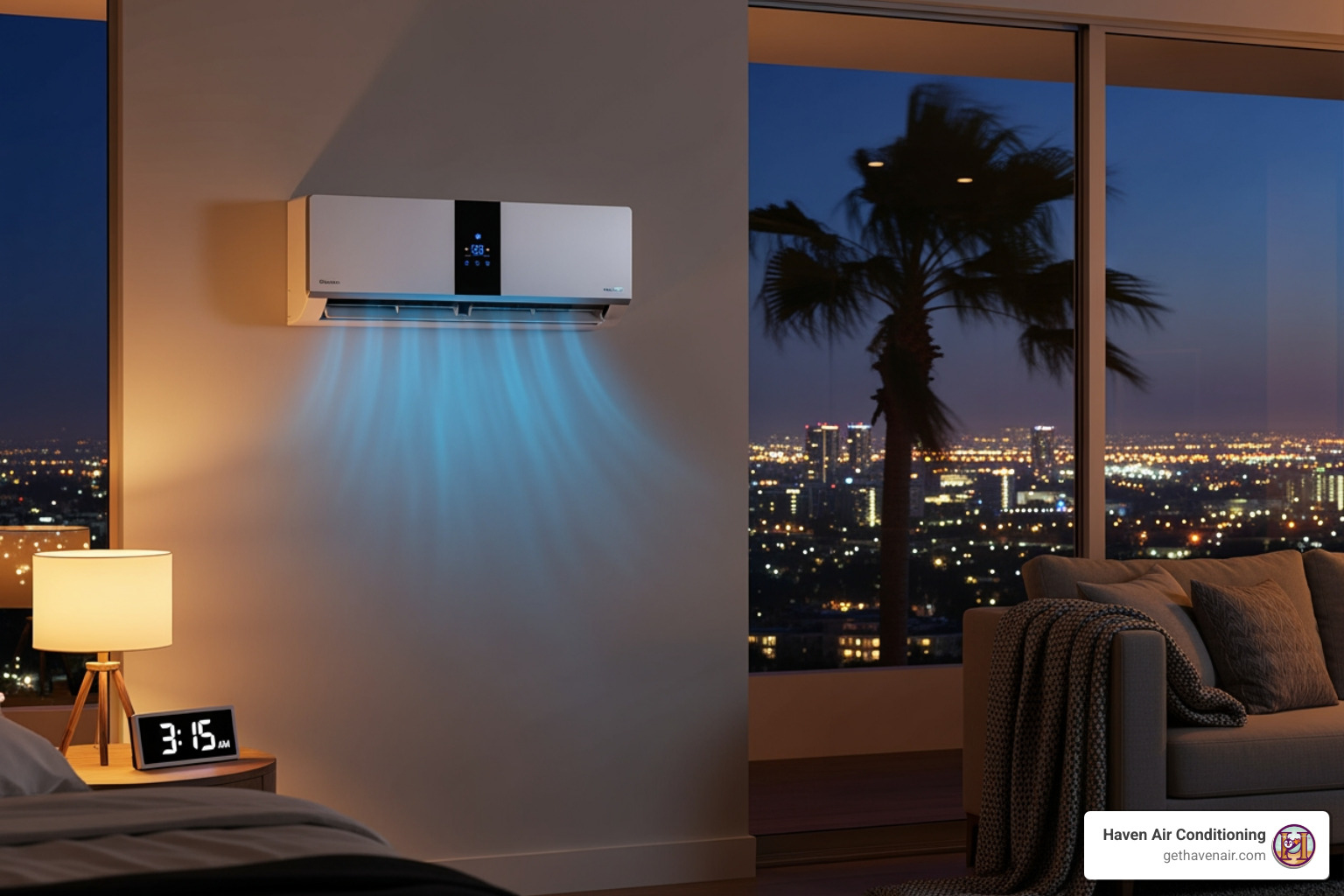Why Your AC Service and Repair Needs Quick Action
When you need urgent AC Service, AC Repair, AC Not Cooling, HVAC Service Visit, it usually means your system is running but not cooling. If your AC runs constantly but your home is still hot, this guide is for you.
Quick Solutions for AC Not Cooling:
- Check thermostat settings: Ensure it’s set to “cool” and the temperature is 5 degrees below the room temp.
- Replace dirty air filter: Clogged filters block airflow and reduce cooling.
- Clear outdoor unit: Remove debris within 2 feet of the condenser.
- Reset circuit breakers: Check breakers for both indoor and outdoor units.
- Call professionals: For refrigerant leaks, compressor issues, or electrical problems.
AC systems run about 1,200 hours per season and need regular maintenance. Repair costs can range from $100 for simple fixes to over $1,500 for major components. Knowing when to call a professional can save time and money. Most cooling problems involve airflow, electrical systems, or refrigerant. Homeowners can handle airflow issues, but electrical and refrigerant problems require a licensed technician for safety and legal reasons.
3 Quick Changes to Try When Your AC is Not Cooling
Before scheduling an AC Service call, try these three simple troubleshooting steps. They are safe, easy, and often solve common cooling problems without a professional visit.
If your AC Not Cooling problem continues after these checks, it’s time for professional help. For more details, see our guides on Your AC Running But Not Cooling and Air Conditioner Not Cooling: What to Check.
1. Check Your Thermostat and Power
A wrong setting or tripped breaker is a frequent cause of AC failure. First, check your thermostat. Ensure it’s set to “Cool” and the temperature is at least 5 degrees below the current room temperature. If it’s a programmable model, verify the schedule isn’t preventing cooling. Also, check the batteries, as dead batteries can cause the screen to go blank or malfunction.
Next, check the power. Your central AC Service system has two power sources: one for the indoor unit and one for the outdoor condenser. At your main electrical panel, find the breakers labeled “AC,” “Furnace,” or “HVAC.” If a breaker is tripped, flip it completely off, then back on. Near the outdoor unit, there is a separate disconnect switch in a small box. Make sure this switch is in the “on” position.
2. Clear the Airflow Path
Proper airflow is essential for cooling. The most common issue is a dirty air filter, which restricts airflow and forces the system to work harder. Check your filter monthly and replace it every 1-3 months, or more often if you have pets.
Also, make sure all indoor supply vents and return air grills are open and not blocked by furniture or other items. Finally, inspect the outdoor condenser unit. It needs at least 2 feet of clear space around it to release heat effectively. With the power turned off, gently hose off any dirt or leaves from the condenser coils to improve efficiency.
3. Inspect for Obvious Issues
Visible signs can point to a specific problem. Ice on the indoor evaporator coil or outdoor refrigerant lines indicates an issue, often restricted airflow or low refrigerant. If you see ice, turn the AC off immediately to let it thaw and prevent damage.
Water leaking from the indoor unit usually means a clogged condensate drain line. This line removes humidity, and a clog can cause water to back up. Turn off the AC to prevent water damage.
Finally, listen for unusual noises like grinding, squealing, or hissing, and be aware of strange smells. A burning smell could be an electrical problem, while a musty odor may indicate mold. These are strong signs you need professional help. For more on warning signs, see our guide on Signs You Need Expert 24 Hour AC Repair.
When to Call for Professional AC Service, AC Repair, AC Not Cooling, or an HVAC Service Visit
If DIY troubleshooting doesn’t solve your AC Not Cooling problem, it’s time to call a professional. Some issues require specialized tools, training, and expertise to ensure a safe and effective repair.
Complex AC Repair involving electrical components, refrigerant, or mechanical parts can be dangerous for homeowners to attempt. DIY repairs can also void your manufacturer’s warranty. Our certified technicians at Haven Air Conditioning can diagnose the problem correctly and fix it right the first time. For more on our services, see our AC Repair Services page. If you’re unsure, our guide on Signs Your System Needs HVAC Repair Services can help.
Signs of a Deeper Problem Requiring AC Repair
Certain symptoms indicate a serious issue that needs professional attention.
- Warm air blowing from vents often points to a failing compressor, a major refrigerant leak, or an issue with the evaporator coil.
- System short cycling, where the AC turns on and off in short bursts, puts extreme strain on the compressor and can lead to premature failure.
- Loud grinding noises usually indicate failing fan motor bearings in the indoor or outdoor unit.
- Burning smells could signal a dangerous electrical problem like burnt wiring. Turn off your system immediately and call for service.
- Hissing sounds are a telltale sign of a refrigerant leak.
Many of these problems involve critical parts like a bad capacitor, which starts the AC’s motors, or a faulty contactor. If your AC compressor not working, it’s a major repair that requires an expert.
Understanding Refrigerant Leaks
Your AC system operates on a closed loop and does not “use up” refrigerant. If your system is low on refrigerant, it means there is a leak.
Handling refrigerant is definitely not a DIY fix. It requires certified technicians with specialized equipment due to strict environmental regulations. Modern laws require that leaks be repaired before refrigerant is added. The situation is more complex for older systems using R-22 refrigerant (Freon), which has been phased out. A significant leak in an R-22 system may make replacement a more cost-effective option than repair. Our licensed technicians can safely detect and repair leaks and recharge your system according to all regulations. For more information, read about our Quick and Reliable AC Repair Services.
Deciding Between Repair and Replacement
Deciding whether to repair or replace your AC can be difficult. Here are some factors to consider:
- Age: Most air conditioners last 10 to 15 years. If your system is in this range and needs a costly repair, replacement is often the better financial choice.
- Frequent breakdowns: If you are calling for repairs every season, a new system will be more reliable and cost-effective in the long run.
- The 50% rule: If a repair costs more than 50% of the price of a new system, replacement is generally recommended.
- Energy efficiency: Modern units have much higher SEER (Seasonal Energy Efficiency Ratio) ratings than older models. A new, high-efficiency system can lead to significant savings on your monthly energy bills and comes with a new warranty.
Our team provides honest assessments to help you make the best decision for your budget and needs. To learn about the replacement process, see our guide on What to Expect During HVAC Installation.
What to Expect from a Professional HVAC Service Visit
When you call Haven Air Conditioning for an AC Not Cooling issue, we make the process transparent and stress-free. Our certified technicians provide upfront pricing and clear communication, so you know the cost before any work begins.
Most HVAC Service Visit calls begin with a diagnostic fee, typically $80-$150. This covers the technician’s time and expertise to accurately identify the root cause of the problem. For more on our service approach, see AC Service: What Our Professionals Offer.
The Diagnostic and Repair Process
Our technicians perform a comprehensive diagnostic process to pinpoint the issue.
The system assessment includes a visual inspection of indoor and outdoor units for obvious problems like ice or leaks. We then perform an electrical component check, testing capacitors, contactors, and wiring. A refrigerant pressure test using specialized gauges tells us if the system has a leak or is improperly charged. We also conduct a coil inspection and cleaning, as dirty coils are a common cause of poor cooling. Finally, a blower motor check ensures air is circulating properly.
After the diagnosis, you’ll receive a detailed Home Care Report explaining our findings and the exact cost for repairs. Simple fixes like a thermostat replacement may take 1-2 hours. More complex jobs, like a compressor replacement, may take longer or require a second visit for parts.
Common AC Repair Costs
While costs vary, here are estimates for common AC Service repairs:
| Repair Type | Estimated Cost Range |
|---|---|
| Diagnosis Fee | $80–$150 |
| Refrigerant Recharge | $200–$600 |
| PCB (Printed Circuit Board) Replacement | $250–$800 |
| Compressor Repair/Replacement | $500–$1,500 |
| Fan Motor Replacement | $150–$400 |
| Sensor Replacement | $100–$300 |
Note: These are estimated costs and can vary based on your specific system, location, and the complexity of the job.
Refrigerant recharge costs depend on the type and amount needed, with older R-22 systems being more expensive. The PCB is the system’s “brain,” and its replacement can resolve control issues. Compressor replacement is a major repair, and we will always discuss if a system replacement is a more financially sound option, especially for older units.
The Importance of Annual AC Maintenance
Annual AC maintenance is preventative care that catches small problems before they become major breakdowns. A yearly tune-up improves system longevity, boosts energy efficiency for lower utility bills, and is often required to maintain warranty validity. An annual HVAC maintenance visit typically costs $100-$200, a small investment compared to the cost of emergency repairs or premature replacement. Learn more about our HVAC Preventive Maintenance program and schedule a tune-up to ensure your system is ready for the season.
Frequently Asked Questions about AC Service and Repair
When an AC system malfunctions in the Greater Orange County Area, homeowners often have the same urgent questions. Here are answers to the three most common ones we receive.
Why is my air conditioner running but not cooling my house?
This is the most common AC Not Cooling complaint. If you hear the system running but the air isn’t cold, it’s usually due to one of three issues.
- Dirty Air Filter: A clogged filter severely restricts airflow, preventing cool air from circulating. This is the first thing you should check.
- Dirty Outdoor Coil: The outdoor condenser unit releases heat from your home. If its coils are covered in dirt or debris, it can’t dissipate heat effectively, causing the system to run without cooling.
- Low Refrigerant: A leak in the refrigerant lines means the system lacks the substance needed to transfer heat. This requires professional service to find and fix the leak.
How often should I have my AC serviced?
We recommend a professional AC Service tune-up at least once a year, preferably in the spring before the cooling season begins. An annual HVAC Service Visit is crucial for several reasons. It ensures your system runs at peak efficiency, lowering energy bills. It also allows technicians to catch and fix minor issues before they become major, expensive breakdowns during a heatwave. Regular maintenance extends your system’s lifespan and is often required by manufacturers to keep your warranty valid. For more on preparing your system, see our guide to Spring AC Tune-Ups and System Inspection.
Can I fix my air conditioner myself?
While we encourage homeowners to be proactive, only certain tasks are safe for DIY AC Repair. You can and should regularly perform tasks like changing the air filter, checking thermostat settings, resetting circuit breakers, and clearing debris from the outdoor unit.
However, any work involving electrical components, refrigerant lines, or internal mechanical parts should be left to a licensed professional. These systems involve high voltage and high-pressure refrigeration systems that are dangerous to handle without proper training and tools. Attempting complex repairs can also void your warranty. For safety and to ensure the job is done correctly, always call a professional for anything beyond basic maintenance.
Stay Cool and Comfortable with Expert Help
If you’ve tried the quick fixes and your home is still not cooling down, it’s time to call for professional AC Service, AC Repair, AC Not Cooling, HVAC Service Visit. Ignoring a persistent AC problem can lead to more significant damage and higher energy bills. A professional technician can accurately diagnose the issue, whether it’s a simple capacitor replacement or a complex refrigerant leak, and perform the repair safely and effectively.
At Haven Air Conditioning, your comfort is our priority. As your neighbors in the Greater Orange County Area, we are committed to providing exceptional customer service and attention to detail. Our team of certified, friendly professionals offers expert HVAC services, including installation, maintenance, and repairs, to ensure your cooling system is reliable all season long.
When you choose Haven Air Conditioning, you’re choosing peace of mind. For expert service that restores your comfort, trust our certified team. Schedule Your AC Repair Today.
